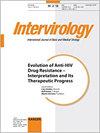SARS-COV-2 Triggers the Development of Class I and Class II HLA Antibodies in Recovered Convalescent Plasma Donors
IF 1.8
4区 医学
Q3 VIROLOGY
引用次数: 1
Abstract
Various studies have shown that SARS-CoV-2 is a highly immunogenic virus. It is known that different types of immunogenic viral pathogens could trigger the formation of HLA antibodies. Therefore, there is a concern that the SARS-CoV-2 could also induce the development of HLA antibodies in volunteers, who donate convalescent plasma after their recovery from COVID-19. HLA antibodies have been identified as the main cause for transfusion-related acute lung injury (TRALI), a well-documented life-threatening complication of transfusions. The TRALI risk could be high in COVID-19 patients who need convalescent plasma, as such patients usually have already an impaired respiratory system affected by the SARS-CoV-2 infection. In this study, we screened 34 convalescent plasma donors on the presence of antibodies against HLA class I and II antigens. All included donors have no any history of sensitization events such as blood transfusions, pregnancy, or previous transplants. We found a high rate of HLA antibody formation in convalescent plasma donors. The frequency of positivity for HLA antibodies for class I, class II, class I and II, and the overall reactivity was 23%, 31%, 46%, and 76%, respectively. The presented data suggest a closed correlation between SARS-CoV-2 virus infection and the development of HLA antibodies in recovered convalescent plasma donors. This finding might have the potential to reduce the risk of TRALI and mortality rate in COVID-19 patients by implementing HLA diagnostic strategies before the administration of convalescent plasma.严重急性呼吸系统综合征冠状病毒2型触发康复血浆捐献者I类和II类HLA抗体的产生
各种研究表明,严重急性呼吸系统综合征冠状病毒2型是一种高度免疫原性的病毒。众所周知,不同类型的免疫原性病毒病原体可以触发HLA抗体的形成。因此,有人担心,SARS-CoV-2也可能诱导志愿者产生HLA抗体,这些志愿者在新冠肺炎康复后捐献恢复期血浆。HLA抗体已被确定为输血相关急性肺损伤(TRALI)的主要原因,TRALI是一种有充分记录的危及生命的输血并发症。需要恢复期血浆的新冠肺炎患者TRALI风险可能很高,因为这些患者的呼吸系统通常已经受到SARS-CoV-2感染的影响。在这项研究中,我们筛选了34名恢复期血浆捐献者是否存在针对HLA I类和II类抗原的抗体。所有纳入的捐献者都没有任何致敏事件史,如输血、怀孕或既往移植。我们发现在恢复期血浆捐献者中HLA抗体形成率很高。I类、II类、I类和II类HLA抗体的阳性率和总体反应性分别为23%、31%、46%和76%。所提供的数据表明,严重急性呼吸系统综合征冠状病毒2型病毒感染与康复期血浆捐献者HLA抗体的产生之间存在密切相关性。这一发现可能有可能通过在服用恢复期血浆前实施HLA诊断策略来降低新冠肺炎患者患TRALI的风险和死亡率。
本文章由计算机程序翻译,如有差异,请以英文原文为准。
求助全文
约1分钟内获得全文
求助全文
来源期刊

Intervirology
医学-病毒学
CiteScore
5.40
自引率
0.00%
发文量
13
审稿时长
6-12 weeks
期刊介绍:
''Intervirology'' covers progress in both basic and clinical virus research, and aims to provide a forum for the various disciplines within virology. Issues publishing original papers alternate with thematic issues, focusing on clearly defined topics. This thematic concentration serves to make timely reviews, research reports and controversy easily accessible to both specialists in the field and those who want to keep track of the latest developments outside their own area of interest. In addition to original papers, regular issues publish short communications and letters to the editor to provide readers with a forum for the exchange of ideas and comments. The scope encompasses work on the molecular biology of human and animal viruses, including genome organization and regulation, and the structure and function of viral proteins. The pathogenesis, immunology, diagnosis, epidemiology, prophylaxis and therapy of viral diseases are considered.
 求助内容:
求助内容: 应助结果提醒方式:
应助结果提醒方式:


